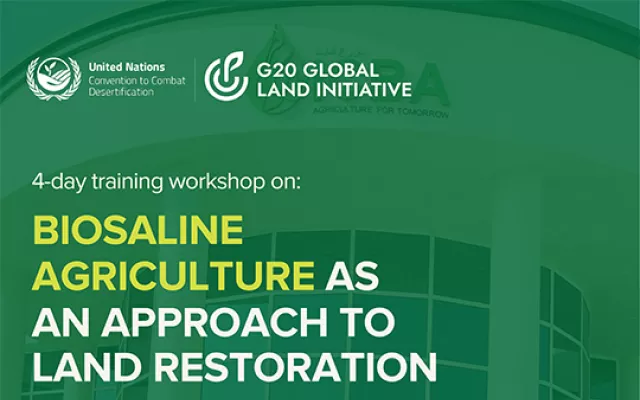ICBA, Abu Dhabi farming authority ink deal to help local farmers
20 December 2018
The International Center for Biosaline Agriculture (ICBA) and the Abu Dhabi Farmers' Services Centre (ADFSC) have joined forces to help farmers improve agricultural production in marginal environments, including saline areas, in the United Arab Emirates (UAE).
The collaboration was formalized through a memorandum of understanding (MoU) signed by Dr. Ismahane Elouafi, Director General of ICBA, and His Excellency Nasser Mohammed Al Junaibi, Acting CEO of ADFSC, on 20 December 2018.
Under this agreement, ICBA and ADFSC will, among other things, strengthen cooperation to develop projects aimed at improving the productivity of date palm trees, vegetables and fodder crops that are being grown in highly saline soils, and study water requirements of date palm, fodders and other crops.
While praising the partnership with ICBA, H.E. Nasser Mohammed Al Junaibi said: “We are pleased to work with ICBA as one of the world's leading institutes in terms of biosaline agriculture and using saline water in irrigation. The move reflects our commitment to provide all types of the technical and scientific support to farmers to achieve a sustainable agricultural policy by exploiting the available natural resources of soil and water.”
He added that the need to develop means to optimize the use of water resources has become a global trend due to water scarcity. Moreover, the search for ways to make use of saline water is an environmental necessity; it helps to overcome desertification and contributes to increasing agricultural crops' productivity, which supports food security. He stressed ADFSC's keenness to keep pace with any development that serves the agricultural sustainability in Abu Dhabi and benefits farm owners as well.
"The MoU is valid for five years which may be extended by mutual consent. It allows the implementation of joint projects to increase the productivity of date palm and vegetables in highly saline soils. Furthermore, it includes the use of remote sensing technologies and sensors to track the outbreak of diseases and pests affecting crops, as well as finding solutions to address those problems using mobile apps, improve crop productivity and achieve sustainable agricultural development," H.E. Nasser Mohammed Al Junaibi noted.
He expressed hope that the MoU would contribute to improving agricultural productivity and developing farmers' technical capacities, help develop halophyte-based agriculture and optimize the use of Abu Dhabi's farms.
For her part, Dr. Ismahane Elouafi said: “Throughout its 19 years of operations in the UAE, ICBA has had several research and development projects with UAE agriculture and water sectors, namely in Abu Dhabi, the emirate with the highest number of farmers. ICBA’s research is behind several policies in Abu Dhabi, aimed at reducing water use in agriculture, such as the ban of Rhodes grass in 2010, a thirsty forage that was inappropriate for the UAE environment but was yet very popular. As we are striving to benefit farmers and farming communities in our beloved host country, the UAE, we are delighted to sign this MOU with ADFSC to strengthen and amplify our support to farmers in Abu Dhabi via know-how and technology transfer.”










